| University | Kaplan University (KU) |
| Subject | Introduction to Management |
Learning Objectives
LO 1 Summarize what people want and what organizations need from their leaders
LO 2 Discuss the similarities and differences between leading and managing
LO 3 Identify sources of power in organizations
LO 4 List personal traits and skills of effective leaders
LO 5 Describe behaviors that will make you a better leader and identify when the situation calls for them
LO 6 Distinguish between charismatic and transformational leaders
Leadership
Leader :
- One who influences others to attain goals.
- The greater the number of followers, the greater the influence
Key Leadership Behaviors :
- Challenge the process
- Inspire a shared vision
- Enable others to act
- Model the way
- Encourage the heart

Managing Vs Leading
Managing :
- Behavior that provides guidance, support, and corrective feedback for Managing day-to-day activities.
Leading :
- Behavior that gives purpose and meaning to organizations, envisioning and creating a positive future.

Power and Leadership
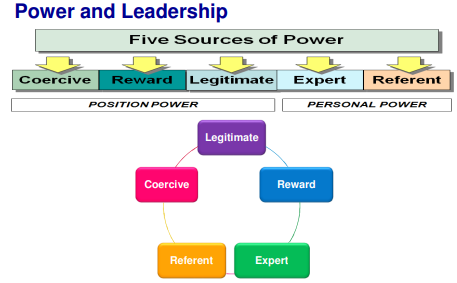
Hire a Professional Essay & Assignment Writer for completing your Academic Assessments
Native Singapore Writers Team
- 100% Plagiarism-Free Essay
- Highest Satisfaction Rate
- Free Revision
- On-Time Delivery
Why a Person Becomes a Leader: Traditional Explanations
- Trait Theories
- Leadership Style
- Behavioral Theories
- Contingency Theories
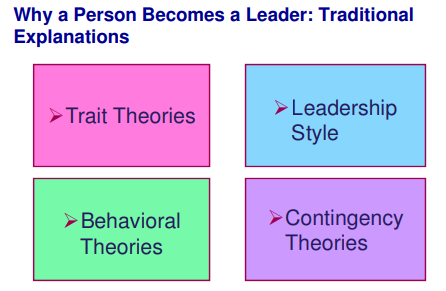
Traditional Explanations
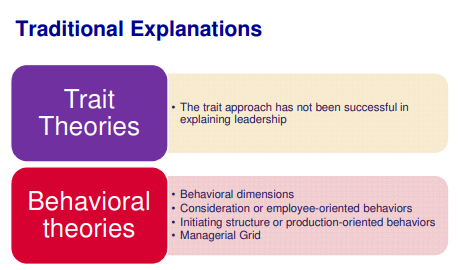
Managerial Grid – Behavioral theories
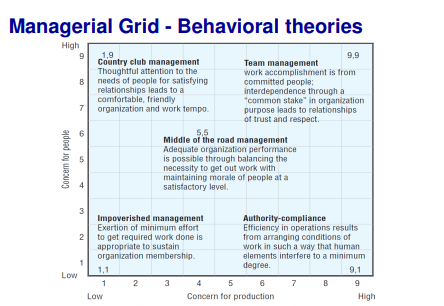
Traditional Explanations
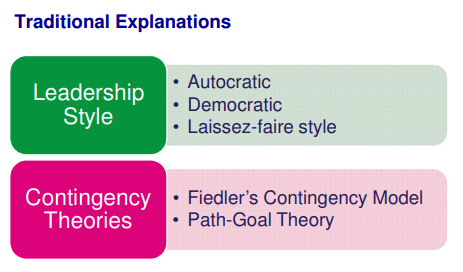
Fiedler’s Contingency Model
Factors of the situation :
- Leader-member relations
- Task structure
- Position power
Two major leadership styles:
- Task-oriented leadership
- Relationship-oriented leadership
Fiedler’s Contingency Model

Buy Custom Answer of This Assessment & Raise Your Grades
Path-Goal Theory

Contemporary Perspectives on Leadership
- Charismatic leader
-A person who is dominant, self-confident, convinced of the moral righteousness of his beliefs, and able to arouse a sense of excitement and adventure in followers.
Contemporary Perspectives on Leadership
- Transformational leader
– A leader who motivates people to transcend their personal interests for the good of the group. - Transactional leaders
– Leaders who manage through transactions, using their legitimate, reward, and coercive powers to give commands and exchange rewards for services rendered. - Level 5 leadership
– stresses the individual responsibility of employees to develop their own
work priorities aligned with organizational goals. - Postheroic Leadership
– Make people responsible for their own performance - Leader-Member Exchange
– The relationship between each follower and the leader is unique.
Tutorial: Group Discussion Questions
You are the HR Director of a chain of computer shops. At one particular store, staff have been coming in late for work.
1. Explain an example how the following powers can be utilised to solve the problem of staff coming in late for work.
a. Legitimate power
b. Reward power
c. Coercive power
2. Also discuss a negative consequence of using each one of the powers.
Stuck with a lot of homework assignments and feeling stressed ? Take professional academic assistance & Get 100% Plagiarism free papers
Need help with your Introduction to Management assignment? Our expert Singaporean writers are here to support you with ITM Bridging Topic 05 - Leading. Singaporean students can now pay someone to do your assignment and enjoy affordable, high-quality management assignment writing services that are 100% human-written, with no AI involvement. We guarantee A+ results, on-time delivery, and plagiarism-free content. Let us take the stress off your shoulders and ensure your success!
Looking for Plagiarism free Answers for your college/ university Assignments.
- ComfortDelGro Organisational Design Assignment Report: ESG Alignment with UNGC Principles & Sustainability Strategy
- Bomb Threat Management Assignment: Incident Response Plan for High-Risk Facilities in Singapore
- Security Concept Plan Assignment Report: International School Campus Protection Strategy at Jurong East
- CM3065 Intelligent Signal Processing Assignment Report: Midterm Exercises on Audio Captcha, Steganography & Speech Recognition
- BUS306 Risk Assessment Case Study: Outback Retail Ltd Audit Strategy and Substantive Testing Plan
- PSB6013CL Digital Marketing Strategies Project: Exploring Consumer Purchase Intentions in the Fashion E-Commerce Industry
- FinTech Disruption Assignment Report: Case Study on Digital Transformation in Financial Services Industry
- Strategic Management Assignment : Netflix vs Airbnb Case Analysis on Competitive Strategy and Innovation
- Strategic Management Assignment Report: Unilever Case Study on Industry Analysis and Growth Strategy
- PSB6008CL Social Entrepreneurship Assignment Report: XYZ Case Study on Innovation and Sustainable Impact

